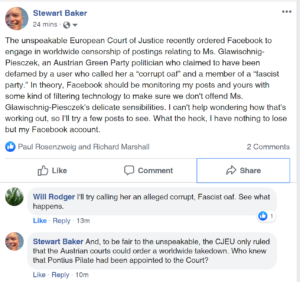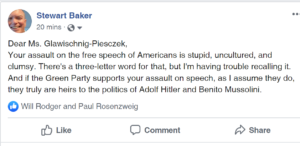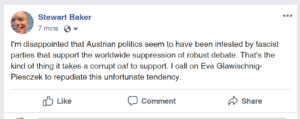The Volokh Conspiracy
Mostly law professors | Sometimes contrarian | Often libertarian | Always independent
Is Europe censoring what Americans say online?
I put my Facebook account at risk (again) to find out
Let's see how this works out:




Editor's Note: We invite comments and request that they be civil and on-topic. We do not moderate or assume any responsibility for comments, which are owned by the readers who post them. Comments do not represent the views of Reason.com or Reason Foundation. We reserve the right to delete any comment for any reason at any time. Comments may only be edited within 5 minutes of posting. Report abuses.
Please to post comments


Isn't it the worst when foreign governments make laws that affect people all over the world?
International injunctions FTW!
I was thinking of Trump’s Iran sanctions, but sure.
Its our world, you're just living in it.
But more accurately, its our world financial system, you are just using it.
Yes, and it's our world regulatory system. With a global product like social media, highest standards win. Congratulations on being able to free-ride off our (relatively) non-corrupt lawmakers!
If your Facebook account survives that, try posting "Eric Ciaramella."
I'm in a Facebook group and we experimented with the name you mentioned. In nearly all instances, Facebook removed the post. We wrote the name backwards and forwards, didn't matter, got removed. When we created a fake Captcha with the name, nothing happened; the post is still active after several weeks.
That's absurd and really just makes me laugh. I wonder what basis they would give for this particular censorship?
I can't recall the exact verbiage but it essentially read that the post violates their community standards and terms of use.
Of course but which term or community standard has been violated? They won't give an answer of course.
*Reads a series of infantile Facebook posts made about a prominent public figure, ostensibly to "test" whether Facebook will take them down pursuant to a court order*
*Reads by-line noting that the author of these infantile posts is a partner at Steptoe & Johnson, a prominent national law firm*
Hm.
Very brave of you, SimonP, to come to the rescue of the prominent public figure. I hope he turns out all right.
I note that the defendant in the ECJ case wasn't the Delaware parent company Facebook Inc. nor the US subsidiary Facebook Operations LLC but rather the subsidiary Facebook Ireland. That subsidiary, which provides Facebook services everywhere outside North America, was created as part of a "Double Irish" tax shelter arrangement to avoid paying almost all taxes on corporate profits earned outside the US. I have to admit I can't muster much indignation that a company incorporated in an EU country and that operates exclusively outside the US is subject to EU law.
Excellent point.
"a company . . . that operates exclusively outside the US"
Really though? Does Facebook in the U.S. and North America not include content from outside North America to the exact same extent as that from within, and vice versa?
I mean, it's possible that Facebook's elaborate structure of intercompany agreements would allow you to parse and define "operate" in such a way, but the reality is Facebook is a global integrated platform, engineered and supported primarily by people in HQ.
They can dissolve the Irish subsidiary, operate from US corporations, and pay the damn taxes. Do you believe the universe owes them the ability to use the law of multiple jurisdictions when it suits them, and ignore it when it doesn't?
No I agree with you there. And these tax avoidance schemes are a joke.
But I would think that a European court's authority would be limited to dictating what can be published inside of Europe, and nowhere else.
Moreover, I would think their authority to dictate what Facebook can "publish" or facilitate the publishing of, within the borders of Europe, may exist regardless of where "Facebook" is incorporated.
Yes, the Court's judgment didn't hinge on Facebook Ireland being incorporated in Ireland, rather than in the US.
ML, that is one theory. Another is that states bear some responsibility for policing the actions of their natural and corporate citizens overseas, and a third that they should be empowered to protect their citizens from harm in third countries. The answer varies according to the situation, and is generally left up to each country to decide. (Despite what Stewart Baker wrote, the ECJ didn't impose a worldwide injunction in this case, it ruled that european law didn't preclude the Austrian court from issuing one.)
Applying your preferred rule exclusively would lead to results you probably don't want. Should Americans be able to divulge classified information in China, as long as China doesn't object?
Do you know which other Austrian was a fascist oaf?
Old man yells at clouds.